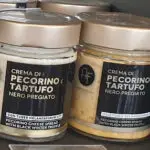Rich, bold, and creamy, Greek coffee is known for its strong, dark flavor that rivals a cup of espresso. Served with a traditional sweet pasty such as an almond cookie, decadent loukoumi, or flaky baklava, Greek coffee is a staple that’s embedded deep in the Greek peninsula and islands’ culture.

Crafted from Arabica coffee beans, water, and sugar in a briki coffee pot, Greek coffee dates to the days of the Ottoman Empire. With a unique flavor, thick and creamy texture, and bitter undertones, Greek coffee is packed with polyphenols and other healthy compounds. Greek coffee differs from regular coffee or espresso due to its consistency, taste, and process.
Discover this guide to Greek coffee’s definition, origins, flavor, coffee bean origin, and its place in Greek culture.
What Is Greek Coffee?
Greek coffee is coffee that is unique to Greek culture. While it is similar to Turkish coffee, there are a few regional process differences, such as sweetening protocol, spices, and foam levels.
Greek coffee is thick and strong because the powder-fine coffee grind is boiled with water in a briki coffee pot. The coffee isn’t strained. Instead, the fine ground coffee cooks into a thick consistency like syrup. The coffee is either drunk black and foamy or with sugar added afterward.
This creamy, caffeinated drink is enjoyed by young and old and holds a special place in Greek culture.
What Does Greek Coffee Taste Like?
Unless they have traveled to Greece, have Greek relatives, or frequent traditional Greek cafes, many people haven’t tasted the rich syrup that is classic Greek coffee.
Greek coffee tastes roasted, with a rich and sweet flavor or foamy and bitter taste. Since it can taste overpowering, particularly if served without sugar, Greek coffee often comes with a glass of water on the side as a palate cleanser.
Greek coffee is also bold, black, and strong, with a thick swirl of fine grounds left in the cup. The top will taste delicate and foamy to show that the beans have been properly roasted.
Greek Coffee Origin and When Do Greeks Drink It?
Greek coffee was not always known as Greek coffee. For four hundred years, the coffee consumed in Greece took its name from the country’s Turkish invaders.
First discovered in ancient Arabia, the hot drink made from coffee beans became popular for trade with the Persians. The first coffee shop even opened in Constantinople in 1425.
The first time the Greeks encountered coffee occurred after 1453 when the Ottoman Turks invaded Constantinople and destroyed the remnants of the Byzantine Empire. For 400 years, the Greeks adopted some Turkish cultural practices and resisted Ottoman rule.
From 1821-1832, the Greek war for independence, also known as the Greek Revolution, raged as the Greeks fought successfully to free themselves from their foreign overlords. With independence won, the Greeks began reclaiming their culture for themselves.
By this time, thick, bitter, or sweetened coffee had become an important part of the Greek culinary heritage. During the nineteenth century, many cafes already existed around the country. Prior to the revolution, Greeks were banned from entering cafes or drinking coffee there.
Once the country won independence, the Greeks began opening their own coffee shops. It wasn’t until the political tensions during the Istanbul Riots in 1960, along with Turkey’s Cyprus invasion during the 1970s, that the word “Turkish coffee” became politically incorrect.
The Greeks wanted to avoid any reference to their former colonialists and rename their national coffee “Greek coffee”. It didn’t hurt that a Greek man located in Thessaloniki accidentally created another version of Greek coffee a few years earlier in 1957.
When he didn’t have the hot water needed to make instant coffee, he shook fine ground coffee together with cold water and sugar until he made a cold brew with a thick, foamy consistency.
Today, many Greeks enjoy coffee as an integral part of their daily routine and culture.
Hundreds of coffee shops are scattered around the country. In sleepy, sun-washed villages, old men sit outside a traditional Greek café, or kafeneio, passing the time of day and enjoying a caffeinated beverage. Business is often conducted over coffee.
It is drunk day and night by locals, so there are few times that the Greeks don’t drink coffee.
See also: Our guide for a typical Greek breakfast.
Does Greece Grow Coffee Beans?
Some coffee enthusiasts may find it surprising that Greece doesn’t grow its own coffee beans.
While the temperate Mediterranean weather is suitable for many kinds of flora and fauna, the coffee bean requires a tropical climate like the climate found throughout the African sub-continent and Latin America.
Instead, Greek coffee is made from Arabica beans often sourced from the Garzon region in Columbia, south of the capital city of Bogota. Beans grown and processed in this region are considered some of the best coffee in the world.
After the beans are harvested and processed, they are ground into a super fine powder. A Greek coffee grind is extremely fine and much finer than a regular fine grind that is found in many different countries around the world. Greek coffee does share a fine-grind consistency with Turkey and other nations across the Middle East.
How Is Greek Coffee Different?
While Greek coffee is made in a way that is like Turkish coffee, the Greek people consider this coffee as their own creation.
Greek coffee differs from regular brewed coffee since it isn’t brewed in a coffee machine. Instead, it contains a much higher coffee-to-water ratio than other types of coffee.
A Greek coffee process also uses a briki which is available in various demitasse cup sizes. This enables them to create the perfect amount of foam that is integral to the Greek coffeemaking process. Many people judge Greek coffee’s quality based on the foam or kaimaki. When the foam is present when the coffee is served, this means that the coffee is made from properly roasted beans.
extra fine ground coffee beans are added to hot water on a stovetop and brought to a boil. When the water evaporates, the soft and saturated coffee grounds sink to the bottom of the drink.
Greek coffee practice pours the hot coffee gently from this bed of grounds through the strainer, which creates a thick, syrupy, and velvety beverage. The flavor hovers between roasted with a slightly bitter, burnt taste.
Greek coffee also contains far less caffeine than many other brewing methods, including filter coffee. For instance, one cup of Greek coffee has around 40mg of caffeine while a similar size cup of filter coffee can contain anywhere from 100-160mg of caffeine.
The boiling process extracts many more antioxidants, nutrients, and other heart-healthy compounds from the coffee bean. The result is a rounder, full-bodied flavor that’s thick and creamy at the same time.
Greek Coffee vs. Turkish Coffee
At the root, Greek coffee is Turkish coffee adopted and claimed by Greek culture. In Turkey, a person orders a Turkish coffee, while in Greece, the order will be for a Greek coffee.
When someone orders a coffee sweetened with sugar in Turkey, it is made in the Arabic war. Traditionally, the coffee is brewed together with sugar directly in the cezve metal strainer. Turkish coffee may also have additional spice fragrances from cinnamon or cardamom.
Another major difference between Greek and Turkish coffee is that Turkish coffee makers often let the drink foam more before serving.
Greek Coffee vs. Espresso
Compared to the intense flavor and high caffeine content, Greek coffee is considered a milder but more bitter option.
While it can seem easy to confuse the two kinds of coffee drinks, Greek coffee has a very different process and caffeine level than espresso shots. For example, espresso is brewed using hot water, speed, and pressure to extract a strong shot of espresso from fine-ground coffee beans in just 20-40 seconds.
In contrast, Greek coffee has a slower, more manual process that’s reminiscent of Greek culture’s laid back-style where business is often completed over lunch or a leisurely cup of coffee.
In fact, Greek coffee isn’t brewed at all. It is boiled on the stove using water and a fine Arabica grind. Then the boiled coffee is filtered through the hammered copper or stainless steel briki container into a cup called an ibrik or brakkos.
This process results in coffee that is very different from an espresso in consistency, taste, and caffeine amounts. One cup of Greek coffee has 40mg of caffeine compared to 75mg of caffeine in an equal amount of espresso.
Final Thoughts
Since the thirteenth century, the thick and bitter boiled coffee brought by invading Ottoman Turks has been a cultural staple in the Greek peninsula and the surrounding archipelago of islands.
Since the Greeks won their independence in 1830, the renamed “Greek coffee” became a symbol of Greek culture, independence, and culinary history. Today, Greek coffee is still prepared in a very different way than either regular coffee or espresso.
The traditional process, fine ground beans, briki, and rich flavor have continued to capture the palate for hundreds of years.
- The Top Restaurants Specializing in Truffle Dishes - August 10, 2023
- Truffle Panna Cotta: A Decadent Dessert Recipe for Truffle Lovers - August 7, 2023
- Truffle Scrambled Eggs: A Luxurious Breakfast Delight - August 7, 2023








